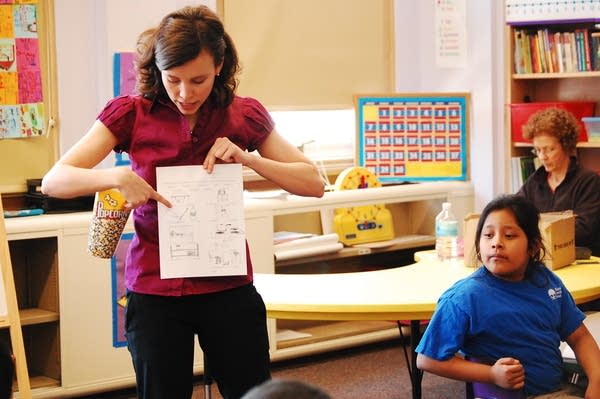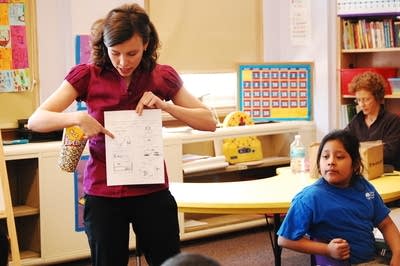Senate set to take up alternative teacher licensure
Go Deeper.
Create an account or log in to save stories.
Like this?
Thanks for liking this story! We have added it to a list of your favorite stories.

The state Senate could take up a bill Thursday that would establish more ways for people to become teachers if they didn't take the traditional path of earning an education degree.
Similar legislation failed last year, but with new Republican majorities in both chambers, it's expected to pass this time around.
It's been a year of firsts for Abby Snyder. It's her first year as a teacher, and her first experience with a Minnesota winter.
But this Florida native knew what shew was getting into -- she picked the Twin Cities for placement in the Teach for America program.
Turn Up Your Support
MPR News helps you turn down the noise and build shared understanding. Turn up your support for this public resource and keep trusted journalism accessible to all.
Snyder was a public relations major. She said Teach for America armed her with extensive training last summer. While she admits she still has plenty to learn, just like any first-year teacher, she said she enjoys great support from fellow teachers.
"I have been able to learn so much from the veteran teachers around me and collaborate with them. Collaboration with those veteran teachers has really helped me feel prepared," she said.
Snyder has landed in a kind of alternative teacher haven in the Twin Cities. She works at Hiawatha Leadership Academy, a charter school in south Minneapolis where 20 of the school's 30 teachers are either current Teach for America teachers, or alums of the program, including principal Shannon Blankenship.
"Many people who go into education went into education because they wanted to do whatever it takes to make sure kids learn, and if you inject that with some new excitement and energy," Blankenship said. "Together we can start to move towards the conversation towards outcomes for kids."
The school is so new it only has one year's worth of test score data. Nearly 70-percent of last year's third graders were proficient in both reading and math, and the school made what the state calls "adequate yearly progress." While that's not enough data to be conclusive, Blankenship said it's an indication the school is on the right path, especially considering the vast majority of the school is English Language Learners who live in poverty.
This is Teach for America's second year in Minnesota. Ninety teachers are now placed at nearly three dozen metro-area schools. While those 90 are less than half a percent of the state's 52,000 teachers, they're part of a significant debate at the Capitol.
Even the nation's Education Secretary Arne Duncan weighed in during a recent visit. "The fact that this state hasn't been more open around alternative certification for teachers doesn't make sense to me," he said.

The state's teachers union, Education Minnesota, says it supports alternative licensure, but it has opposed past legislation. Union president Tom Dooher said those proposals allow would-be teachers to avoid the rigorous standards needed to become a teacher in Minnesota.
"Doctors are in residency programs and lawyers clerk. You are demonstrating to someone that has proven they can do those professions that you have that same skills," he said. "And I don't think we should diminish the importance of teaching."
Dooher adds he's optimistic a deal can be reached, though the union doesn't support the current version of the legislation.
Under the bill, non-traditional teaching candidates could get a two-year license, as long as they also join a state-approved program that offers further instruction towards a full-fledged license.
The only program like that in Minnesota right now is Teach for America, but supporters say other organizations could locate here. They could focus, for example, on mid-career professionals who want to become teachers, or teachers with licenses in other states who want to teach in Minnesota.
The key is anyone wanting to become an alternatively-licensed teacher, no matter the pathway, would have to go through one of these programs.

The disagreement has been over the make-up of those programs. The teacher's union says they should be affiliated with colleges of education or other education institutions - that's not required in the current bill.
The union also says teachers should at least have a degree in the field where they want to teach, so that art majors don't end up teaching chemistry. And the union wants teachers to be supervised in the classroom by another licensed teacher for the first three months.
Supporters have balked at those changes, in part, by noting that schools get the final say. If a program is ever set up that does a poor job of preparing teachers, districts don't have to hire them.
With Republicans now in control of both the state House and Senate, passage of the alternative licensure bills is expected. Gov. Mark Dayton hasn't opposed the idea of altnerative licensure, but he also hasn't yet weighed on on the specific proposal before the Senate.
"I think the bottom line for us in looking at any education innovation is whether it will benefit the school children of Minnesota. If it does, then I'm in favor of it," he said.
The author of that Senate bill, Republican Gen Olson, says she has a meeting with Dayton Thursday morning to see if there's an agreement to be worked out.
Dear reader,
Political debates with family or friends can get heated. But what if there was a way to handle them better?
You can learn how to have civil political conversations with our new e-book!
Download our free e-book, Talking Sense: Have Hard Political Conversations, Better, and learn how to talk without the tension.




